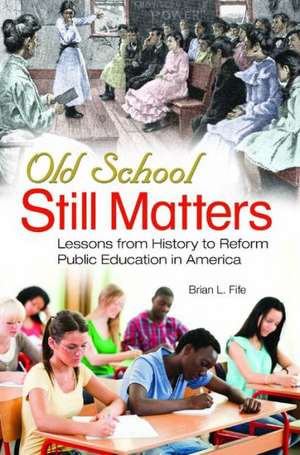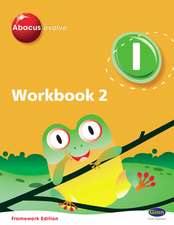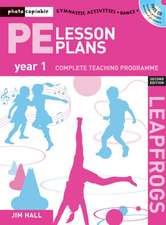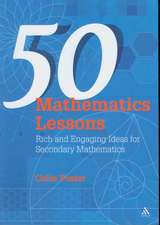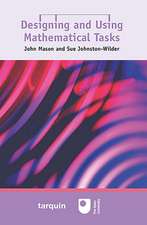Old School Still Matters: Lessons from History to Reform Public Education in America
Autor Brian L. Fifeen Limba Engleză Hardback – 11 aug 2013 – vârsta până la 17 ani
Preț: 369.04 lei
Preț vechi: 451.10 lei
-18% Nou
Puncte Express: 554
Preț estimativ în valută:
70.62€ • 72.85$ • 58.93£
70.62€ • 72.85$ • 58.93£
Carte tipărită la comandă
Livrare economică 26 martie-09 aprilie
Preluare comenzi: 021 569.72.76
Specificații
ISBN-13: 9780313398094
ISBN-10: 0313398097
Pagini: 352
Ilustrații: 8 bw illus
Dimensiuni: 156 x 235 x 25 mm
Greutate: 0.73 kg
Editura: Bloomsbury Publishing
Colecția Praeger
Locul publicării:New York, United States
ISBN-10: 0313398097
Pagini: 352
Ilustrații: 8 bw illus
Dimensiuni: 156 x 235 x 25 mm
Greutate: 0.73 kg
Editura: Bloomsbury Publishing
Colecția Praeger
Locul publicării:New York, United States
Caracteristici
Provides a thorough analysis of the writings of Horace Mann, the education reformer largely credited with helping to create the common school in the 19th century
Notă biografică
Brian L. Fife, PhD, is professor of public policy at Indiana University-Purdue University Fort Wayne. His published works include Praeger's Reforming the Electoral Process in America: Toward More Democracy in the 21st Century and Higher Education in Transition: The Challenges of the New Millennium.
Cuprins
Acknowledgments1 Horace Mann and the Common School IdeologyThe Idea of Public Education for AllThe Importance of Theory and History in Education ReformPublic versus Private InstitutionsThe Common School Ideology of the 1830s and 1840sHorace Mann's Common School Ideology in the Contemporary World and Beyond2 The Market-Based Ideology and Politics of the Conservative RightTwentieth-Century Conservative PhilosophersThe Impact of Conservatism on American Politics since 1980Policy Implications of the Market-Based Ideology and Conservative Political Philosophy3 Education and the Politics of FederalismThe Abstract Nature of the Federalism DebateThe Evolution of Federalism in the United StatesThe Whig Party of the Nineteenth CenturyNational Intervention in K-12 Public EducationThe Serious and Somber Policy Implications of NCLB4 Education and the Politics of Consumerism and ConservatismThe McGuffey Readers of the Nineteenth and Early Twentieth CenturiesConsumerism DefinedThe Evolution of the Consumer IdeologyThe Commercialization of Public EducationA Century-Old Illusion5 Education in the Early Twenty-First CenturyK-12 Public School DesegregationSchool Choice in the Contemporary WorldRevisiting the School Choice Debate6 Citizenship in a Republican Form of Government in the Twenty-First CenturyThe Omnipresent Reality of Systems TheoryThe Role of the Citizen in a RepublicPolitical Participation in a RepublicThe More Proactive Citizen in the American Republic7 Education: A Public Good Worth DefendingThe Need for a Fearless Advocate of Public EducationRevisiting the Individualist Creed in the United StatesWhat Is a Public Good?8 Blueprint for Progressive ReformReform Premise A: Maintain Horace Mann's Common School IdealReform Premise B: Maintain and Expand Civic Education in the Public SchoolsReform Premise C: Repeal NCLB in Its Entirety and Deemphasize High-Stakes Standardized TestingReform Premise D: Reduce Poverty in AmericaReform Premise E: Citizens Must Become More Engaged in the Electoral ProcessReform Premise F: Embrace the Communitarian PhilosophyReform Premise G: Revisit Federal Budgetary PrioritiesReform Premise H: Rethinking the Status Quo with Regard to the School Year and the School DayReform Premise I: Minimize the Influence of Business in Public EducationReform Premise J: Students, Parents, and Caregivers Are Part of the SolutionA Concluding CommentNotesBibliographyIndex
